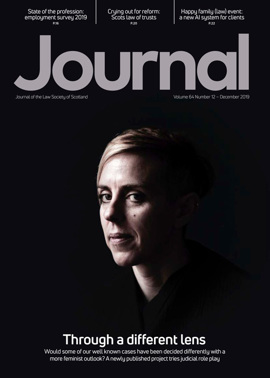Access all areas

The more diverse a firm’s workforce, the more dynamic and successful it will be. When people of different backgrounds, socio-economic groups and ethnicities come together, they are more likely to avoid groupthink and embrace innovation. But creating a diverse Scottish business is not easy. According to research published last year by the Fraser of Allander Institute, social mobility in Scotland is marginally worse than in the rest of the UK. The odds of a Scot being in a top-tier job, when his or her parents were also in such a job, are 2.21 times better than for others less fortunate.
For the rest of the UK, the figure is 2.17.
Diverse or perverse?
Whatever one’s view of tuition fees, it is clear that diversity is not helped by the Scottish Government’s policy of free university education, which results in a cap on the number of places offered to Scottish students. Our universities receive an annual payment of only £1,800 per student. Thus their enthusiasm for recruiting students from the rest of the UK, who pay £9,000 per annum, and students from abroad, who may pay substantially more. The official Government aspiration is that by 2021, students from the 20% most deprived backgrounds should represent at least 16% of full time, first degree entrants to Scottish universities. Again, this is worse than the rest of the UK, where the figure for such entrants is currently over 20%.
The former First Minister, Alex Salmond, said famously that “the rocks would melt with the sun” before tuition fees were introduced. It is therefore noteworthy that next year, the Society will be undertaking a trial of a non-graduate apprenticeship route to becoming a solicitor. Speaking of the sun, there is nothing new under it, and this is certainly true of professional development. In the 70s, my contemporaries following the primrose path to becoming chartered accountants would join a firm on leaving school, and emerge fully qualified five years later. They were far from overjoyed at having to sweat through classes at evenings and weekends while we were living the high student life, with the benefit (imagine!) of a Government grant.
But the system worked. The modern profession of accountancy was created in Scotland when a royal charter was granted by Queen Victoria in 1854. The Scottish accountant became and remains a distinguished global brand. Graduate entry is a comparatively modern innovation, but the wheel has partially come full circle, with major accountancy firms now offering a range of apprenticeship schemes in different disciplines. The position is currently more restricted for would-be lawyers, and so the Society’s pilot is very welcome.
Pilot cleared for takeoff
Assuming there is enough law firm support, which is likely but not guaranteed, in September 2020, 15 to 20 school leavers will become apprenticed, and undertake in-house training for five years, supplemented by online academic work. Everyone successfully completing the programme will qualify as a solicitor. They will have missed out on the pleasures and perils of a university education, but will have banked five years’ salary, and be well ahead of their peers taking the seven-year degree/diploma/traineeship route. The Society hopes that as well as benefiting the profession, by providing it with a wider talent pool, this scheme will make a positive contribution to social mobility, by providing an attractive route for young people from low income families to enter the profession.
It is a worthy aim, but there are bear traps in wait. Firms, rightly, will look for evidence of high academic achievement, and there is not a level playing field. Students from more affluent areas frequently have access to superior schooling, and/or private tuition. It is common now for universities to contextualise results, taking into account the obstacles faced by disadvantaged students. But this is quite a sophisticated exercise. Will law firms have the skills, and more to the point, the will, if a sufficient number of more affluent students want to go down this route? On a related point, more affluent students are typically more confident (not always with good reason) and socially accomplished. Will firms take the trouble to identify students with the talent and potential to succeed, but who at this early stage of their development are less poised?
These are legitimate concerns, but they do not seem insoluble. The law is academically rigorous, but its practice (the clue is in the name) is intensely practical, and involves acquiring a myriad of skills not taught at university, which take years to learn, and are best taught by example. This scheme will allow the time and space. I look forward to seeing the apprentices of 2020 swell in number and go on to become a truly significant part of the profession.






